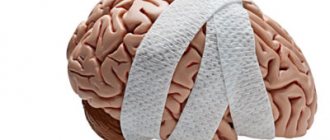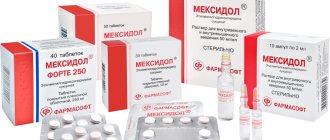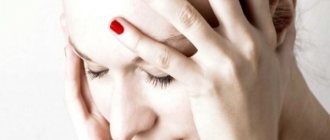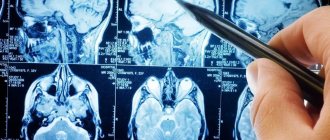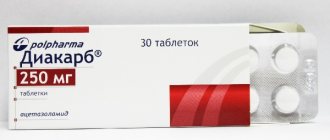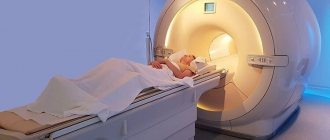Home>Articles>Alcohol intake during concussion
quick menu (hide)
- Brain injury
- Concussion and alcohol
- Risk factors
- The effect of alcohol on the brain
- Should you drink if you have a brain injury?
- conclusions
Even a mild concussion imposes serious restrictions on alcohol consumption. Nicotine addiction is also prohibited and you will have to give up smoking. For such injuries, bed rest is prescribed, which excludes any irritating factors. A concussion often increases sensitivity to bright lights and loud sounds, and drinking alcohol will only worsen the patient’s condition.
Alcohol during a concussion increases cell damage , which can lead to serious consequences. Failure to comply with the prescribed treatment regimen can cause mental disorders, impaired motor function, decreased concentration and the development of dementia. After a concussion, headaches can last a lifetime. It is important to know that pain, nausea and coordination problems increase many times over .
Diagnosis: brain injury
Damage to brain tissue has specific manifestations that immediately affect your well-being. The conclusion about a concussion is made when there is a disruption in the functionality of the brain caused by injuries to the skull. In this case, even the presence of a wound is not at all necessary, and a strong blow without signs of external damage will be enough. Participation in a fight or an accidental fall often leads to similar results. Alcohol is especially harmful during a concussion; the consequences of its use will make treatment ineffective and can be fatal.
consult a doctor immediately . It will not be difficult to make a preliminary diagnosis by analyzing the patient’s well-being. A concussion is accompanied by the following symptoms :
- the occurrence of nausea and gag reflexes;
- a sharp increase in pressure ;
- rapid pulse and cardiac arrhythmia ;
- intermittent and labored breathing .
Such disturbances in well-being are often noticeable even from the outside. In case of concussions, alcohol becomes especially dangerous and its use should be completely avoided. Ethanol has a damaging effect on blood vessels and aggravates the consequences of functional disorders. Deciding how much to drink after such an injury is quite simple. You should not drink alcohol even in small doses; perhaps this glass will be your last.
Brain injury and alcoholic beverages
Even after overcoming the acute period of concussion, the patient's condition improves only partially. Insomnia, dizziness, headaches and difficulty concentrating continue to make themselves felt for a long time. Drinking alcohol after a concussion is strictly prohibited . Alcohol consumption has symptoms similar to brain injury, and the combination of these processes can lead to irreversible health consequences.
If you have a brain injury, you should refrain from driving a car or climbing to heights on your own. Taking alcohol in any form is out of the question. Both strong and low-alcohol drinks should be excluded. Drinking alcohol will not only worsen your physical condition. Anxiety, depression or impaired mental abilities are just a few of the possible consequences. Alcohol in case of brain injury contributes to the development of vegetative-vascular dystonia, asthenic syndrome and epilepsy.
How much should you not drink after a concussion?
There are several opinions regarding drinking alcohol after a concussion. Some people tend to believe that for mild concussions it is acceptable to take small amounts of alcohol after treatment. This is not true. Small doses of alcohol are permissible only after six months have passed from the end of treatment procedures, or even more. Although it would be better if, after an injury, the patient gives up alcohol forever, since ethanol can worsen brain processes and activity in general, and against the background of an injury, it can also cause complications after a concussion.
In later life, cheap strong alcohol or wine will have to be excluded. A small amount of high-quality cognac or a glass of excellent red wine is acceptable.
Risk factors for brain injuries
Drinking alcoholic beverages negatively affects the entire body. During intoxication, the vascular system and the brain are most injured. Tissue destruction occurs at the cellular level and has irreversible consequences . Any pathologist can accurately determine how much the deceased liked to drink. The brain of an alcoholic has a highly wrinkled structure and is different from the brain tissue of a non-drinker. Such signs of atrophy appear more and more over time, and drinkers rarely live to an advanced age.
Craving for alcohol often becomes the cause of senile dementia, which manifests itself long before old age. In such people, brain vessels atrophy , which leads to distorted perception and difficulties with logical thinking. Alcohol after a concussion, instead of tissue regeneration, accelerates their degradation. The consequences of drinking alcohol are difficult to predict, and its effect can easily cancel out all the results of treatment.
Nerve cells are destroyed under the influence of alcohol, which also leads to irreversible consequences. Severe intoxication with poisons causes their degradation and death . All organs suffer from poisoning by ethanol breakdown products. Brain tissue is especially susceptible to toxic effects, and over time, such consequences become irreversible. If you drink alcohol frequently, you should not expect the body to recover quickly. In this case, the recovery processes will be inhibited by the destructive influence of alcohol.
The effect of alcohol on the brain
With injuries of this kind, rest and the absence of stress factors are necessary. Ethanol alcohol weakens the functionality of the brain and causes disturbances in the central nervous system. Such risk factors are unacceptable, and it is necessary to exclude any possibility of improving the patient’s condition by drinking. Alcohol after a concussion can not only cause headaches and dizziness, but also cause tremors, psychosis or paranoia.
When there is a high ethanol content in the blood, red blood cells adhere to each other. Such destructive processes cause the destruction of blood vessels. The sticking of red blood cells leads to the formation of blood clots, which completely or partially block the blood supply to the cells. The intensity of such processes depends on the amount of ethanol in the blood and continues throughout the entire period of intoxication. Such processes cause tissue death. Even with moderate alcohol consumption, after 7-12 years, mental impairment .
The effects of alcohol are extremely harmful for both light drinkers and lovers of strong drinks. A cranial concussion requires rest , and ethanol is counterproductive in treatment. Deciding whether you can drink alcohol if you have a concussion is quite simple. In case of such injuries, there is a strict ban on the use of alcohol, which is justified by its destructive effect on the blood vessels of the brain. Drinking alcoholic beverages contributes to the development of serious pathologies that are practically untreatable.
Consequences and complications after a concussion
Even with a single concussion, there is a possibility of developing consequences that will affect the rest of your life. Even after ten years, a person who has once suffered from a concussion may show signs of increased irritability or excessive impressionability due to long-standing trauma. Such people more often than others suffer from excessive tearfulness, chronic fatigue, and deep depressive states. Also, after a concussion, a chronic sleep disorder, fear of enclosed spaces, difficulty trying to concentrate, and hypersensitivity to weather conditions may develop.
The consequences of a concussion can be very dangerous. And if the patient begins to drink alcohol during a concussion, then the likelihood of complications increases many times over. Against the background of alcohol abuse and brain injury, the following occurs:
- headache not relieved by analgesics;
- hypertensive crisis;
- stroke;
- sudden mood swings;
- cerebral edema;
- coma.
To avoid such complications, it is imperative to take the necessary measures to treat brain injury. During the treatment process, it is extremely important to comply with the requirements regarding the regimen, taking medications and quitting alcoholic beverages, as well as smoking. Such a brain injury is dangerous due to mental changes and physical disorders, and alcohol consumption greatly increases the likelihood of such consequences.
Should you drink if you have a concussion?
The presence of alcohol in the blood disrupts the functioning of the brain even in a healthy person. The symptoms of a concussion correspond to signs of intoxication, which indicates some similarity in abnormalities in brain activity. Even a mild form of concussion makes a person more sensitive to the effects of ethanol. In this case, there is rapid intoxication, loss of coordination and a sharp deterioration in well-being . Severe brain injuries may also cause hallucinations.
With a concussion, the effect of alcohol on mental state also increases. Hysteria and irritability arise, and the sick person is not always fully aware of his actions. In medical practice, there are many examples when even a small dose of alcohol became the cause of delirium tremens or other mental disorders. increases the risk of epileptic seizures several times Even the slightest dose of alcohol should be completely avoided until complete rehabilitation.
Drinking alcohol during a concussion causes an acute headache, which will be no less than from the injury. With such pathologies, swelling of the brain occurs and it will take even more time to restore its normal functioning. The consequences of drinking alcohol during a concussion can lead to loss of consciousness, stroke or coma. Acute dependence on alcohol cannot be the reason for even a small dose.
What are we complaining about?
The most “typical” symptoms of a concussion are headache, vomiting (single or repeated), dizziness, and short-term loss of consciousness may occur. What if nothing like that? We were renovating an apartment, fell off a stepladder, hit our heads, but it seems everything turned out okay. Should I worry? It’s worth it if after a few hours you feel weak or lethargic (you shouldn’t chalk this up to fatigue), you start sweating, or you’re irritated by the TV on, bright lights, or you can’t sleep. Do not ignore even the most minor “deviations from the norm.” It’s better to play it safe a hundred times and see a doctor after an injury than to make a mistake once and then have to deal with the consequences for a long time.
conclusions
A concussion is extremely dangerous to your health and the consequences of this injury can be felt throughout your life. Treatment of such functional disorders often requires a long rehabilitation period, during which any alcohol-containing drinks are excluded. If a concussion occurs, is it possible to drink alcohol? You shouldn’t even ask. Medicine does not allow such treatment even for mild cases of this disease.
Drinking alcohol will not help relieve a concussion and will only complicate treatment. Head injuries are especially dangerous because they have unpredictable consequences and any risk factors should be excluded . Proper treatment will not only help you quickly go through the rehabilitation period, but will also reduce the craving for alcohol in the drinker. It is extremely important to exclude complications in the treatment of head injuries, and giving up alcohol will be the right decision.
Contraindications after a concussion
During a concussion, active mental activity, including reading, is not recommended. During the treatment of a concussion, experts prohibit straining the eyes, so victims are strictly prohibited from watching television, reading for long periods of time, sitting in front of a computer, etc. To speed up recovery, it is recommended:
- compliance with the regime;
- exclude mental work, reading books, working on a computer, watching TV shows, etc.
- ensure sufficient time for sleep;
- do not drink coffee, tobacco, or alcohol;
- exclude driving, housework that requires stress.
- Avoid physical strain and stress, noise and light.
After a month has passed from the date of treatment, the patient is recommended to undergo some diagnostic tests again to exclude the possibility of developing various kinds of complications.
Remember that symptoms of depression can occur even with minor concussions. Therefore, if you decide to see a psychologist or psychiatrist to get a prescription for antidepressants, be sure to tell your doctor about any head injuries, as taking antidepressants can lead to complications and longer treatment .
